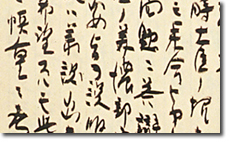HOME > Crisis in Constitutional Politics > a. End of Party Cabinets > Dispute over "Emperor as an Organ of Government Theory"
4-4 Dispute over "Emperor as an Organ of Government Theory"

MINOBE Tatsukichi at his home, reading up a manuscript for media corps. 2 February 1935 (Showa 10). From "Shinbun Rengo Shashin News Vol.1935 no. 9"
The theory of the Emperor as an organ of government (the theory of the nation state as a juridical body) that the Emperor is an organ of the state possessing no authority over and above the state, who exercised power only as the highest organ of the state was widely accepted as an academic construct legally underpinning the Meiji Constitution system. At a plenary session of the House of Peers on 18 February 1935 (Showa 10), however, KIKUCHI Takeo vehemently attached the theory, criticizing the works of constitutional scholar MINOBE Tatsukichi and others. In response, MINOBE, who was also a member of the House of Peers, made a strong "personal defense" of the theory at the plenary session one week later, on 25 February 1935. Sensing opportunity, nationalist groups and others pounced on the issue and started a campaign to discredit the "Emperor as an Organ of Government Theory". The movement to denounce the theory grew in intensity when the Seiyukai, which wanted to overturn the Cabinet, was joined by large segments of the military and local government groups.
The Army Inspector General of Military Training at the time, MASAKI Jinzaburo, wrote in his Diary on 12 March 1935 (Showa 10), that Army Minister HAYASHI Senjuro had declared that he could not accept MINOBE's statements, and desired the total elimination of the "Emperor as an Organ of Government" as an academic theory. Still, HAYASHI also stated that he would initiate measures cautiously, and only in context of other factors. Such statements reveal that the debate on this issue had transcended the academic arena, having burgeoned into a political issue with many groups' political calculations intertwined.
Having called for the resignation of Privy Council President ICHIKI Kitokuro, several members in the anti-theory movement intended to overthrow anyone in power, particularly those in the Imperial Court, who favored maintaining the status quo. In April, the Government passed an act forbidding the sale or distribution of MINOBE's "Kenpo Satsuyo" (Basics of the Constitution) and other books, and also ordered corrections to be published in a revised version. The brouhaha died down after Prime Minister OKADA Keisuke issued the Kokutai Meicho Seimei (Declaration of Clear Evidence of the National Polity) not just once, but twice, in August and December 1935, which denied the "Emperor as an Organ of Government Theory". In essence, that amounted to a public refutation of constitutionalism based on the Meiji Constitution.
Biboroku ("Diary"), Vol. 7
- 12 March 1935 (Showa 10)
- Papers of MASAKI Jinzaburo, #2743
- National Diet Library
